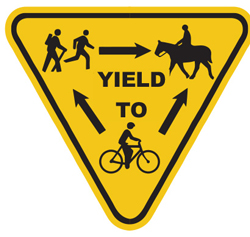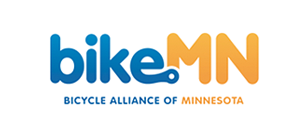Guidelines for Multi-Use Trails and Paths
Paths and trails are often shared by users of all ages and abilities, including bicyclists, walkers, joggers, parents pushing strollers, roller-bladers, and pets. The great variety of users and their varying speeds and mobility can make such riding more unpredictable than riding in the roadway.

- Always wear a helmet and use safety gear.
- Ride to the right.
- Ride single-file when other users are present.
- Always yield to slower path users.
- When stopping for a rest or emergency, move completely off the trail.
- Avoid wearing or using headphones, ear buds, cell phones, radios, or other listening devices while riding so you are not distracted and can be aware of your surroundings.
- Control your speed, slow down, and use caution when approaching or overtaking other path users.
- Before passing others, watch your speed and courteously announce your intentions by saying “on your left” or ringing your bike bell.
- Don’t “spook” children or animals; always yield to them. If passing a horse, use your voice so the horse associates the bicycle with a human.
- Obey all traffic signs and signals at road crossings.
- Use proper lights if riding before daylight or after dusk.
- Point to trail hazards and call out to riders behind you: “Gravel,” “Glass,” etc.
- Use traffic hand signals when appropriate.
For more information on Minnesota trails, visit www.dnr.state.mn.us/biking/index.html
Guidelines for Mountain Biking Trails
Know your equipment and abilities. Carry food, water, and gear for changing weather conditions.
- Ride only on open trails – respect closures, don’t trespass, and obtain authorization if required.
- Don’t ride trails when they are wet, this damages the trail tread and leads to ruts and erosion – and more work for trail volunteers.
- Leave no trace – be sensitive to the environment; stay on existing trails and pack out what you take in.
- Control your bicycle – pay attention! Anticipate problems and keep your speed under control.
- Bicyclists always yield – make your approach known and be courteous. Always yield to uphill users. When stopping for a rest or emergency, move completely off the trail.
- Never spook animals – animals startle easily and can create danger for you and others. Always yield when approaching a horse and ask the rider how to proceed.
For more information on mountain biking in Minnesota, visit www.morcmtb.org.

